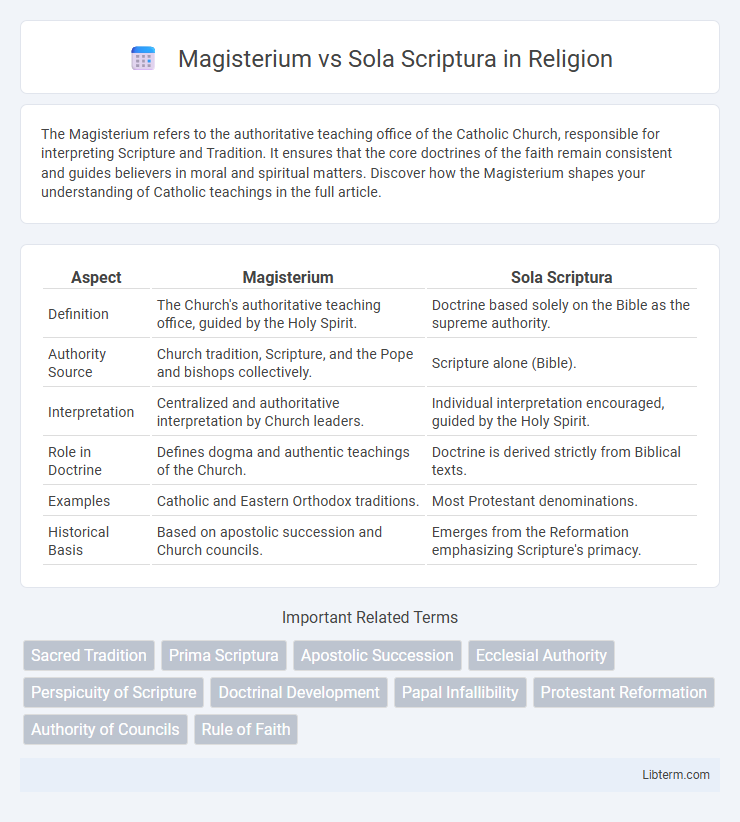The Magisterium refers to the authoritative teaching office of the Catholic Church, responsible for interpreting Scripture and Tradition. It ensures that the core doctrines of the faith remain consistent and guides believers in moral and spiritual matters. Discover how the Magisterium shapes your understanding of Catholic teachings in the full article.
Table of Comparison
| Aspect | Magisterium | Sola Scriptura |
|---|---|---|
| Definition | The Church's authoritative teaching office, guided by the Holy Spirit. | Doctrine based solely on the Bible as the supreme authority. |
| Authority Source | Church tradition, Scripture, and the Pope and bishops collectively. | Scripture alone (Bible). |
| Interpretation | Centralized and authoritative interpretation by Church leaders. | Individual interpretation encouraged, guided by the Holy Spirit. |
| Role in Doctrine | Defines dogma and authentic teachings of the Church. | Doctrine is derived strictly from Biblical texts. |
| Examples | Catholic and Eastern Orthodox traditions. | Most Protestant denominations. |
| Historical Basis | Based on apostolic succession and Church councils. | Emerges from the Reformation emphasizing Scripture's primacy. |
Understanding Magisterium: Definition and Role
The Magisterium refers to the teaching authority of the Roman Catholic Church, consisting of the Pope and the bishops, responsible for interpreting Scripture and Tradition authentically. It serves as the authoritative guide in matters of faith and morals, ensuring doctrinal unity and preventing misinterpretation of biblical texts. This contrasts with Sola Scriptura, which asserts Scripture alone as the sole infallible authority for Christian belief and practice.
Sola Scriptura: Meaning and Historical Roots
Sola Scriptura, a foundational principle of Protestant Reformation, asserts that Scripture alone is the supreme authority in all matters of faith and practice, excluding any equal or authoritative role for church traditions or magisterial teachings. Historically rooted in the 16th century, key reformers like Martin Luther emphasized the Bible's clarity and sufficiency for guiding Christian life, challenging the Catholic Church's Magisterium, which upholds tradition and ecclesiastical interpretation alongside Scripture. This doctrine profoundly shaped Protestant theology by elevating personal Bible reading and interpretation over institutional authority.
Biblical Foundations: Authority in Scripture
The debate between Magisterium and Sola Scriptura centers on the source of biblical authority, with Magisterium emphasizing the Church's teaching authority as a necessary interpreter of Scripture, grounded in apostolic tradition and ecclesiastical guidance. Sola Scriptura asserts that the Bible alone holds supreme authority, insisting that Scripture is the ultimate rule of faith and practice without requiring external interpretation from Church hierarchy. Biblical texts such as 2 Timothy 3:16 and Matthew 16:18-19 are key references, with Protestants highlighting Scripture's sufficiency and Catholics underscoring the role of the Magisterium in authentically conveying biblical truth.
Magisterium in Catholic Tradition
The Magisterium in Catholic tradition serves as the authoritative teaching office composed of the Pope and bishops, tasked with authentically interpreting Scripture and Tradition. It safeguards doctrinal continuity by providing definitive guidance on theological matters, ensuring that interpretations remain consistent with apostolic faith. This authoritative role contrasts with Sola Scriptura, which emphasizes Scripture alone as the sole rule of faith, lacking the interpretive authority vested in the Magisterium.
Interpretative Authority: Who Decides Doctrine?
The Magisterium, representing the teaching authority of the Catholic Church, holds the definitive role in interpreting Scripture and defining doctrine, guided by apostolic succession and Tradition. Sola Scriptura emphasizes the Bible as the sole authority in doctrinal matters, advocating individual interpretation by believers under the guidance of the Holy Spirit. This fundamental difference shapes how doctrine is established, with the Magisterium ensuring doctrinal unity and Sola Scriptura allowing diverse theological understandings.
Church Councils vs. Individual Interpretation
Church Councils serve as authoritative gatherings of bishops that define and preserve core doctrines, ensuring doctrinal unity through Magisterium's teaching authority. In contrast, Sola Scriptura emphasizes individual interpretation of Scripture as the sole rule of faith, often leading to diverse and contrasting theological conclusions. The tension between Magisterium and Sola Scriptura hinges on the authority vested in collective ecclesiastical judgment versus personal biblical exegesis.
Strengths and Challenges of Magisterium
The Magisterium, as the authoritative teaching office of the Catholic Church, ensures doctrinal unity and continuity by interpreting Scripture and Tradition under the guidance of the Holy Spirit. Its strength lies in providing clear, consistent teachings that prevent individual misinterpretations and promote communal faith cohesion. Challenges include perceptions of rigidity, potential resistance to contemporary issues, and tensions with the Protestant principle of Sola Scriptura, which emphasizes Scripture alone as the ultimate authority.
Strengths and Challenges of Sola Scriptura
Sola Scriptura emphasizes the Bible as the sole infallible authority for Christian faith and practice, promoting direct access to Scripture and personal interpretation that fosters individual responsibility and spiritual growth. Its strengths include clarity, simplicity, and a safeguard against potential ecclesiastical corruption or doctrinal error by limiting authority to Scripture alone. Challenges arise from diverse interpretations leading to denominational fragmentation, difficulty in resolving theological disputes without centralized authority, and the need for hermeneutical skills to accurately understand biblical texts.
Contemporary Debates: Unity and Division
Contemporary debates on Magisterium versus Sola Scriptura highlight tensions between ecclesiastical authority and biblical literalism, often influencing denominational unity and doctrinal divisions. The Magisterium, upheld by the Roman Catholic Church, asserts that Church tradition and the teaching authority of the Pope and bishops are essential for authentic interpretation of Scripture. In contrast, Sola Scriptura, a principle central to Protestantism, emphasizes Scripture alone as the final authority, fostering diverse interpretations and contributing to fragmentation within Christianity.
Impact on Christian Life and Practice
The Magisterium, as the authoritative teaching office of the Catholic Church, shapes Christian life by providing definitive interpretations of Scripture and Tradition, promoting unity and doctrinal consistency among believers. In contrast, Sola Scriptura emphasizes personal engagement with Scripture as the sole rule of faith, encouraging individual interpretation and diverse expressions of Christian practice. This difference impacts daily worship, moral decisions, and theological understanding, with Magisterium-guided communities prioritizing hierarchical guidance and Sola Scriptura adherents valuing personal conviction and scriptural primacy.
Magisterium Infographic

 libterm.com
libterm.com